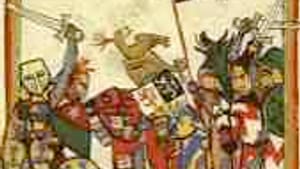Stay in the Loop
BSR publishes on a weekly schedule, with an email newsletter every Wednesday and Thursday morning. There’s no paywall, and subscribing is always free.
Can't stand your job? Why not check out the good old days?
Pennsic's medieval make-believe

During the first two weeks of August, thousands of medieval enthusiasts will gather on a campground in Slippery Rock, Pa., for the biggest annual event of the Society for Creative Anachronism. Pennsic Wars has been described as a full-participation Renaissance Faire, and also as "Burning Man light." To me it's a cross between a university history department, a theater, a really great pub, and a really bad frat party.
During the festival, the campground grows into a city of 10,000 or more, complete with a merchants' area, a food court, classes on medieval life and skills, and the battlefield, where fighters wield rattan "swords" in regulated but unchoreographed battles.
The surrounding landscape fills with tents and pavilions grouped into "households." Some households erect elaborate gates made to look like castle walls. A household called Ravenspittle boasts a pirate ship gate. Casa Bardicci goes further: Each year it builds a full-sized model of an Italian villa.
Social safety valve
The participants themselves include teachers, technology experts, members of the military, performers, artisans, college students, chefs, the unemployed and the underemployed. They come from all over the world, but mostly from all over the U.S. Like Americans in general (whose job satisfaction rate has fallen to only 45% as of 2009, according to The Conference Board), many festival attendees are dissatisfied with their circumstances. Pennsic provides a creative outlet and a friendly and accepting haven.
In Dancing in the Streets: A History of Collective Joy, Barbara Ehrenreich cites a theory that throughout history festivals have functioned as a societal "safety valve." According to this theory, festivals encouraged a population to let off their frustrations in a carnivalesque manner rather than a violent one.
Something to live for
Pennsic functions in a similar fashion. It's such a relief from the daily grind that its regulars refer to the rest of the year as a "50-week money run" and welcome each other "home" at the beginning of each festival. Many attendees work year-round on Pennsic-related projects; when they say that their tent or pavilion is more luxurious than their house or apartment, they're only half-joking. When the British historian E. P. Thompson (quoted by Ehrenreich) described festivals in the Middle Ages, he might have been talking about Pennsic:
"Many weeks of heavy labor... were compensated for by the expectation (or reminiscence) of these occasions, when food and drink were abundant, courtship and every kind of social intercourse flourished, and the hardship of life was forgotten... These occasions were, in an important sense, what men and women lived for."
Pennsic offers campfires and fresh air, live music and dancing, creativity and camaraderie. Surely these basic ingredients in a happy, productive life are worth cultivating. The question remains: Do those ingredients spill over into the rest of the year? Or is the "50-week money run" just about getting by?♦
To read responses, click here and here.
During the festival, the campground grows into a city of 10,000 or more, complete with a merchants' area, a food court, classes on medieval life and skills, and the battlefield, where fighters wield rattan "swords" in regulated but unchoreographed battles.
The surrounding landscape fills with tents and pavilions grouped into "households." Some households erect elaborate gates made to look like castle walls. A household called Ravenspittle boasts a pirate ship gate. Casa Bardicci goes further: Each year it builds a full-sized model of an Italian villa.
Social safety valve
The participants themselves include teachers, technology experts, members of the military, performers, artisans, college students, chefs, the unemployed and the underemployed. They come from all over the world, but mostly from all over the U.S. Like Americans in general (whose job satisfaction rate has fallen to only 45% as of 2009, according to The Conference Board), many festival attendees are dissatisfied with their circumstances. Pennsic provides a creative outlet and a friendly and accepting haven.
In Dancing in the Streets: A History of Collective Joy, Barbara Ehrenreich cites a theory that throughout history festivals have functioned as a societal "safety valve." According to this theory, festivals encouraged a population to let off their frustrations in a carnivalesque manner rather than a violent one.
Something to live for
Pennsic functions in a similar fashion. It's such a relief from the daily grind that its regulars refer to the rest of the year as a "50-week money run" and welcome each other "home" at the beginning of each festival. Many attendees work year-round on Pennsic-related projects; when they say that their tent or pavilion is more luxurious than their house or apartment, they're only half-joking. When the British historian E. P. Thompson (quoted by Ehrenreich) described festivals in the Middle Ages, he might have been talking about Pennsic:
"Many weeks of heavy labor... were compensated for by the expectation (or reminiscence) of these occasions, when food and drink were abundant, courtship and every kind of social intercourse flourished, and the hardship of life was forgotten... These occasions were, in an important sense, what men and women lived for."
Pennsic offers campfires and fresh air, live music and dancing, creativity and camaraderie. Surely these basic ingredients in a happy, productive life are worth cultivating. The question remains: Do those ingredients spill over into the rest of the year? Or is the "50-week money run" just about getting by?♦
To read responses, click here and here.
What, When, Where
Pennsic War 39. July 30-August 15, 2010 at Cooper’s Lake Campground, Slippery Rock, Pa. www.pennsicwar.org.
Sign up for our newsletter
All of the week's new articles, all in one place. Sign up for the free weekly BSR newsletters, and don't miss a conversation.

 Kristen Eaton
Kristen Eaton